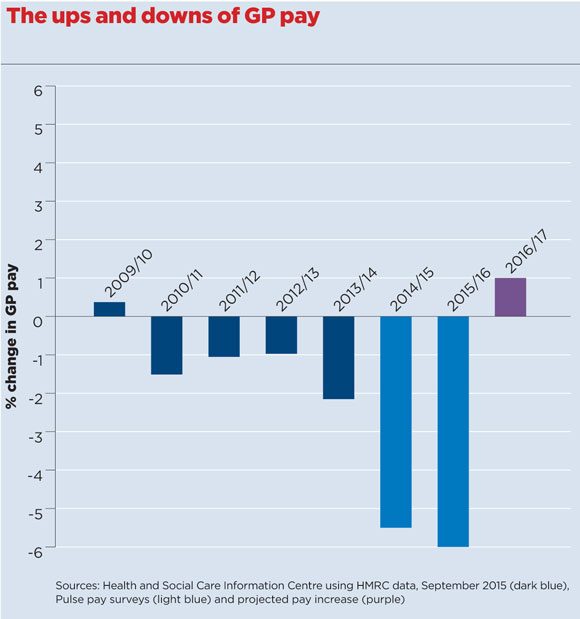
Whatever you might think of Jeremy Hunt, he is a masterful politician. The Teflon minister has overcome stiff odds and in three months will become the longest-serving health secretary ever. But he has also become one of the least popular.
Last month saw a nadir in his relations with the medical profession, with the imposition of a contract on junior doctors eroding any remaining goodwill among doctors.
This followed months of missed targets in A&E and a ‘new deal’ for GPs that blew up in his face. Meanwhile, the whole health service is facing financial meltdown, with trusts running up multimillion-pound deficits and scores of GP practices closing.
A YouGov poll revealed that his public approval rating sunk in the wake of the contract imposition, with just 17% of voters saying he is doing a good job, compared with 65% who think he is doing a poor job. A recent petition calling for his resignation garnered 250,000 signatures.
The very reason Mr Hunt was parachuted in from the culture department in 2012 was to take the health service off the front pages before the general election – and, as such, he was not expected to stay for long.
But following the installation of a Tory majority government, he has been let off the leash and looks more secure in his post than ever.
Not only is he still in post, he is already turning his attention away from junior doctors and refocusing on GPs, promising a new ‘package’ that is set to reform general practice far more than the recently concluded GMS contract negotiations.
One of the reasons he has been given such licence by his boss is that – as one of the shrewdest operators in the Cabinet – he actually has a game plan to deliver promises made in the Conservative party’s 2015 election manifesto.
Impervious
The manifesto promised a ‘truly seven-day NHS’, parity for mental health and 5,000 new GPs by 2020. For most, that would prove an impossible wishlist. But Mr Hunt seems impervious to the naysayers.
The elements of this game plan have a common theme – powerful and populist pledges to patients, announced in grandiose style, yet ultimately left to commissioners and medics to deliver.
The deal is the start of significant new investment
Health secretary Jeremy Hunt
The release last month of a new Mental Health Taskforce report was an attempt to establish parity with physical health – yet the buck has been passed to commissioners to find the £1bn of ‘new funding’ to implement the report’s recommendations.
Meanwhile, the health secretary may have toughed it out with the contract imposition – but it is trusts and junior doctors who are left to draw up weekend rotas in secondary care with strained relationships and no extra funding.
So that just leaves the traditional ‘awkward squad’ – GPs.
But, like the arch-politician he is, Mr Hunt has adapted his tactics and is putting some money where his mouth is.
The new GP contract – announced last month – gives an indication of the direction of travel. After nearly a decade of pay cuts, a £220m funding uplift represents a significant investment of cash into general practice.
For the first time, the contract includes a detailed assessment of rising practice costs for indemnity fees, national insurance, employer superannuation increases and running expenses.
Some of the extra funding will be eaten up by the massive hike in CQC fees, and the whole deal does little to reverse nearly a decade of cuts, but the 3.2% uplift is expected by accountants to deliver a 1% pay uplift for partners – the first income increase for seven years.
And Mr Hunt says ‘this deal is just the start of significant new investment’. General practice has been promised year-on-year funding increases of 4-5% until 2020. Negotiations continue on a new ‘package’ of measures to take the pressure off general practice, thought to be worth around £110m.
This is designed to ‘maintain the profession as the jewel in the crown of our NHS’ and fulfil Mr Hunt’s promise of more new GPs and 10,000 other professionals – such as pharmacists and physician associates – working in general practice.

Smoke and mirrors
Pulse has learned the announcement – planned for February but delayed until next month because of the junior doctors – is expected to contain details of a much-delayed refresh of the GP retainer scheme designed to defuse the looming retirement timebomb. It will also trumpet the release of more than
100 ‘golden hellos’ to tempt GP trainees to work in areas with low levels of training recruitment, such as Lincolnshire, Blackpool, the Lake District and Isle of Wight, as revealed by Pulse last month.
The majority of the money has been used to bail out cash-strapped trusts
Also, there is also likely to be an extension of the Prime Minister’s Challenge Fund, which pump-primes seven-day GP access schemes. Some 57 pilots covering 18 million patients have already been launched – although Pulse has revealed that almost half of those in first wave have already reduced their opening hours due to lack of demand.
All of this will feed into the new voluntary GP contract that is being worked on behind the scenes for 2017. This will be restricted to groups of practices covering at least 30,000 patients and will provide routine seven-day GP access and more specialist services in the community, as envisioned by NHS England’s Five Year Forward View.
But, of course, as might be expected from the master tactician, Mr Hunt’s game plan contains a lot of smoke and mirrors.
The insistence from him and NHS England that they were pumping more money into primary care has been undermined by the fact that the actual proportion of NHS funding devoted to primary care has decreased this year from 7.31% to 7.23%.
The majority of extra funding (£1.8bn) has been used to bail out cash-strapped hospitals. As a result, there is unlikely to be enough money for primary care to carry out what the health secretary is expected to announce in his package. Pulse understands from insiders that the GPC has said £500m will be needed – almost five times the amount actually on offer.
And, in the long run, it might be that this very game plan – and the further distrust that it is likely to bring – turns out to be Mr Hunt’s undoing.
The protracted contract fight with the juniors has been ill advised and has managed to unite the – famously riven – medical profession in opposition against him.
The juniors’ resistance to being bullied into acceptance was – in part – behind the vote at the recent Special LMC Conference to consider mass resignation in six months by GP leaders, whose ultimatum to the Government is unlikely to be met by an underfunded ‘rescue package’.
Before then, cuts to PMS payments will kick in, and will see many more practices suddenly lose large chunks of their funding from April. Many of these will have to cut services, and some may be forced to close altogether.
Crisis worsens
Meanwhile, the GP recruitment crisis continues to worsen, with Health Education England’s campaign to attract medical graduates to general practice failing spectacularly last year, with round one applications for August 2016 falling by 5% to a record low.
And the NHS pension scheme changes that will come into force from April are likely to contribute to the brain drain of older GPs retiring or reducing their working hours.
So the famously lucky health secretary’s game plan hangs in the balance. These next three months are going to test his resilience and may well be decisive in determining his legacy.
Pulse October survey
Take our July 2025 survey to potentially win £1.000 worth of tokens













